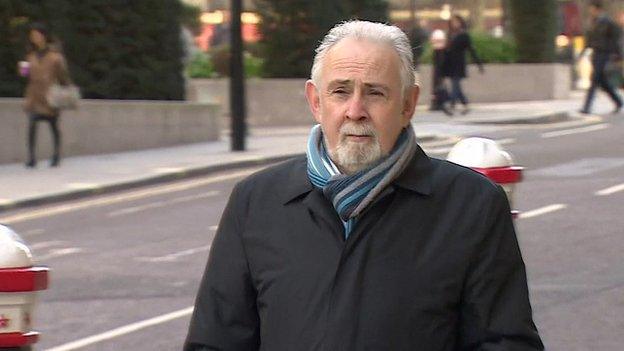OTR letters: Tony Blair says NI peace process could have collapsed without scheme
- Published
Archive: Tony Blair speaking in the House of Commons about paramilitary fugitives in 2005
Former Prime Minister Tony Blair has said the Northern Ireland peace process would probably have collapsed without the controversial On the Runs scheme.
He gave evidence to the Westminster committee investigating the scheme on Tuesday afternoon.
Under the On the Runs (OTRs) scheme, letters were sent to more than 200 republican paramilitary suspects.
The scheme, which was set up in 1999, informed them that they were no longer wanted by police.
The OTR scheme came to public attention in 2014 when one of the letters caused the Hyde Park bomb trial to collapse.
The man accused of it, John Downey, walked free.
The Hyde Park attack killed Squadron Quartermaster Corporal Roy Bright, Lieutenant Anthony Daly, Trooper Simon Tipper and Lance Corporal Jeffrey Young on 20 July 1982.
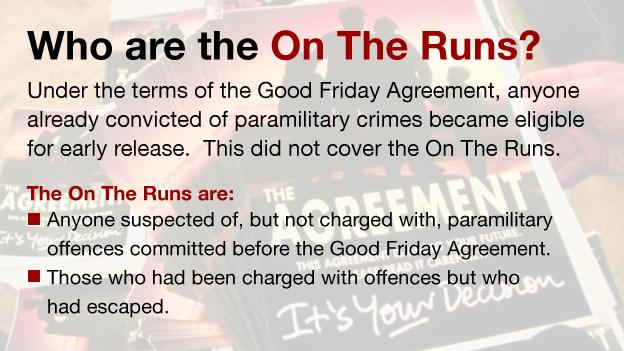
The OTR scheme began while Mr Blair was prime minister. It was set up following talks with Sinn Féin.
Mr Blair told the committee on Tuesday that the scheme was "not an amnesty" and was "not secret".
He said that during his time as prime minister the government had tried to find a way to deal with the issue "comprehensively" and were "unable to do so".
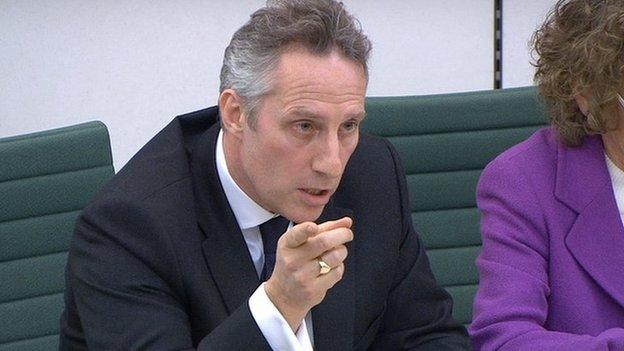
Mr Blair faced robust questioning from the DUP MP Ian Paisley
"At the time we were trying to find a resolution for the On The Runs issue....what happened was that we were never able to find a way through that," he said.
Mr Blair said the On the Runs letters were "absolutely critical to the peace process" and "essential to getting Sinn Féin on board".
He told MPs that "no such letter" should have been issued to John Downey.
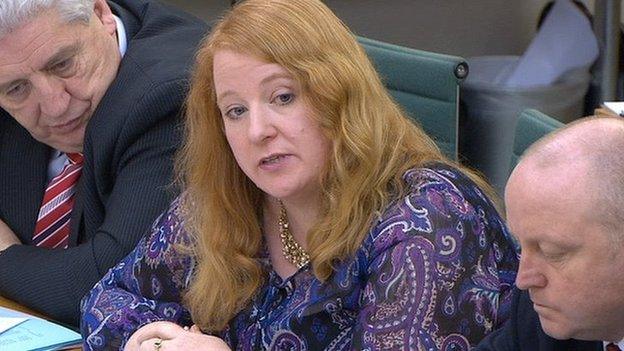
The MP for East Belfast Naomi Long asked Mr Blair whether an alternative process had been suggested
Mr Blair also said he took responsibility for not putting in place a structure that would have prevented the error in the John Downey case, but did not apologise for the letters policy.
Alternative process
In response to robust questioning by the North Antrim MP Ian Paisley, Mr Blair countered: "You sit in the decision making chair for a minute," adding that without the On the Run scheme, there "would not have been a peace process".
The MP for East Belfast Naomi Long also questioned Mr Blair and asked him whether an alternative process had been suggested.
She asked Mr Blair whether he had considered that by informing some people they were not wanted, the scheme implicitly informed others that they were wanted, and helped them to evade prosecution.
Tony Blair apologised for not putting in place a structure that would have prevented an error being made in the On The Runs letters scheme
Mr Blair said telling people they were not liable to prosecution was a perfectly reasonable thing to do.
Mr Blair said on claims that the scheme was secret: "It evolved. It's not that we decided not to tell people, it's just that it wasn't the focus."
Mr Blair said a scheme to deal with OTRs was an "essential component" in keeping republicans in the process and said they would have walked away if such a scheme had not been put in place.
'Difficult circumstances'
"If we'd simply said we're not going to deal with this issue at all, I personally believe it would have had a very serious impact on the process," he told North Down MP, Lady Sylvia Hermon.
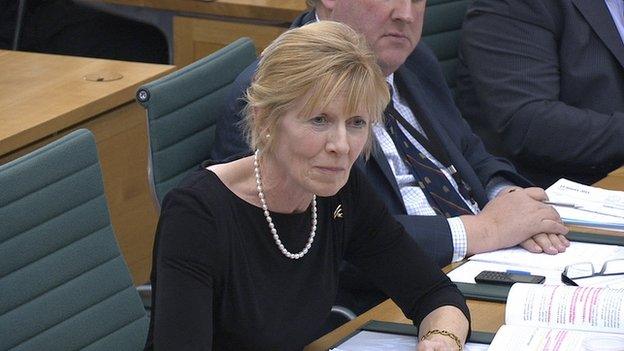
Lady Hermon asked about Mr Blair's current relationship with Sinn Féin and whether he was still in contact with them
He said he had tried to do his best under "very difficult circumstances".
'Secret'
Mrs Hermon, said that while the scheme was referred to in parliamentary records, the existence of the letters was "kept secret" until "John Downey walked out of the Old Bailey".
Mr Blair said republicans had not boasted about the letters because what they wanted was a mechanism to deal with those who were subject to potential prosecution if they returned and were less interested in letters given to people the authorities were not pursuing.
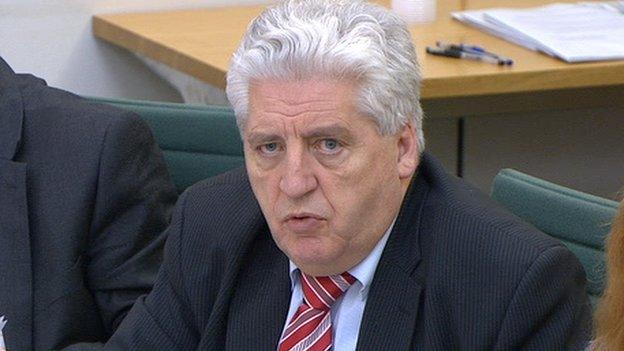
Mr Blair told Alasdair McDonnell he did not know why the Northern Ireland Office sent the letters and not the public prosecution service because he was not involved in that
At the time in 2007 when Mr Blair was coming under pressure to deal more quickly with the OTRs, he believed the political process could falter.
"We almost lost the thing," he said.
To his successors in government, Mr Blair said: "You inherited a peace process that worked, but be careful with it, it's fragile still."
He said he did not think there was "any big issue" about telling people they were not wanted, because we "were not changing the law to do that".
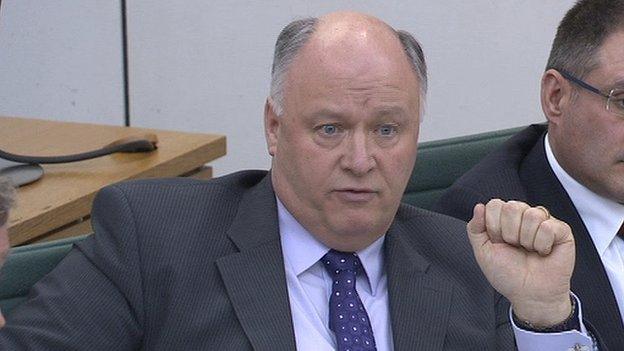
Upper Bann MP David Simpson said there was a "sense of betrayal" among victims, including many sitting behind Mr Blair in the public gallery
Mr Blair said, as in Northern Ireland, killers had been released as part of the Middle East peace process in which he was now involved, and that move had been met with protest too.
"These are hard decisions to take I'm afraid, but the one thing I can say for absolute certainty is that without that provision in the Good Friday Agreement, we would not have had peace.
"Whether it was justified to do it is another matter and I asked myself that hard question at the time, by the way."
Christopher Daly, the brother of a Hyde Park bomb victim, said the family appreciate Tony Blair's decision to appear at the committee
Mr Blair said he would like to seek legal advice before he would be comfortable naming people who had received letters telling them that they were not wanted by any UK police force.
After the hearing, Christopher Daly, whose brother was killed in the Hyde Park bombing, said: "I think both myself and the other families directly impacted by Downey's case will appreciate the fact that Tony Blair decided to appear in person before the select committee and also the fact that he took full responsibility as well as apologising for the mistake that allowed Downey to walk free.
"A catastrophic mistake was made, as identified by Lady Justice Hallett, and somebody needs to be held to account for that mistake or some organisation and it was done on Tony Blair's watch."
The Northern Ireland Affairs Committee is conducting an inquiry into the scheme, and hopes to publish its findings before the end of this month.
It has heard evidence from senior police officers and politicians, including Northern Ireland Secretary Theresa Villiers and a number of her predecessors.
The committee wrote to Mr Blair twice and emailed him several times asking him to identify a suitable date for an appearance.

BBC News NI security correspondent Vincent Kearney
One of the most controversial elements of the Good Friday Agreement was the early release scheme for hundreds of republican and loyalist prisoners but it crucially did not deal with so-called On the Runs.
After negotiations between the government and Sinn Féin, Tony Blair gave Gerry Adams a personal assurance, an undertaking, that he would take steps to resolve this issue.
His government then set up a scheme whereby Sinn Féin could submit the names of individuals who wanted to check their legal status, to see if it was safe for them to return to Northern Ireland or if they could face arrest or questioning if they did so.

He replied by saying his busy schedule meant he was unable to do so.
In November, committee chairman Laurence Robertson MP wrote to Mr Blair, accusing him of being disrespectful to the House of Commons.
However, the situation changed dramatically last week.
The BBC understands the Speaker of the House of Commons, John Bercow, phoned the former prime minister last Tuesday and urged him to give evidence to the inquiry.
It is understood he made it clear that Parliament would take a very dim view of any refusal to do so.
The following morning, the committee was informed that Mr Blair would give evidence on Tuesday afternoon.
Committee members hailed the move as a major victory for parliament.
- Published13 January 2015
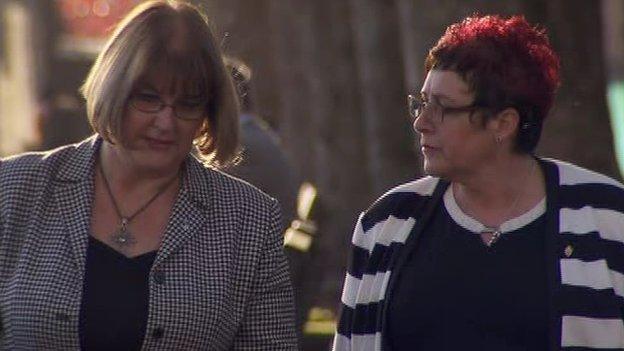
- Published13 January 2015
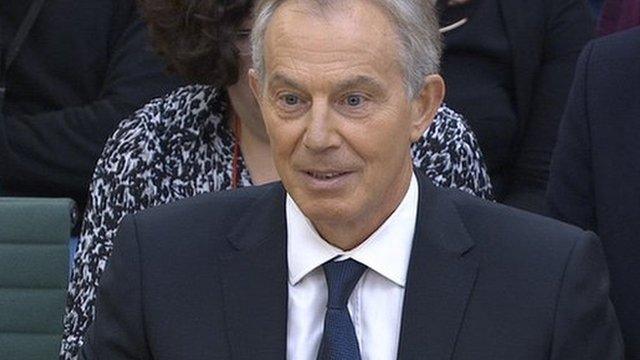
- Published24 March 2015
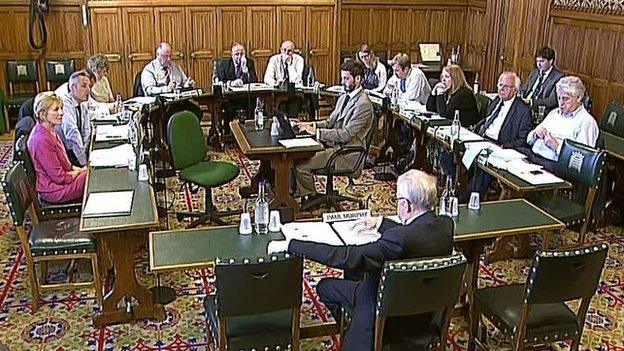
- Published10 December 2014
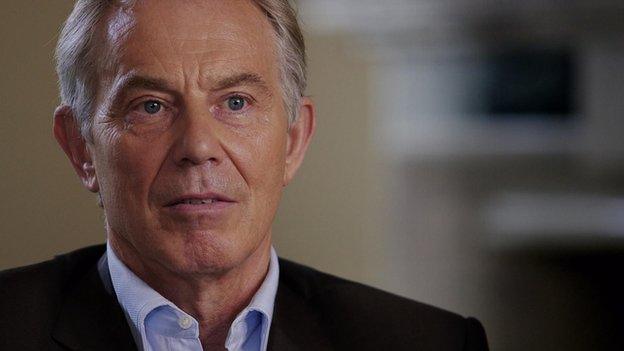
- Published5 November 2014

- Published3 September 2014
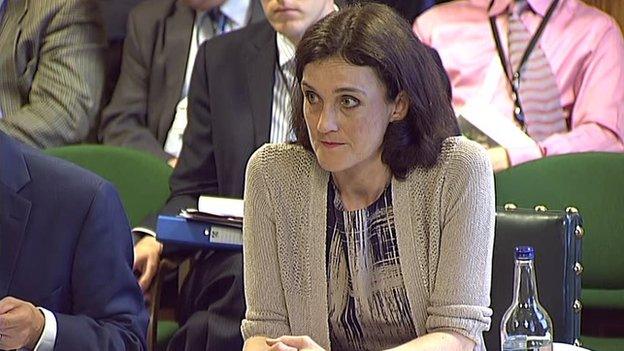
- Published25 February 2014
